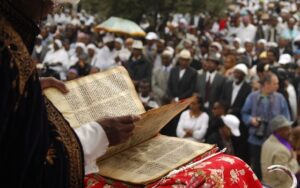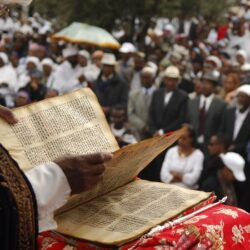Sigd is an Amharic word meaning “prostration” or “worship” and is the commonly used name for a holiday celebrated by the Ethiopian Jewish Beta Israel community on the 29th of the Hebrew month of Marḥeshvan. This date is exactly 50 days after Yom Kippur, usually falling out in late October or November, and according to Ethiopian Jewish tradition is also the date that God first revealed himself to Moses.[1] Jewish Virtual Library, “Ethiopian Jewry: Sigd Holiday“
Sigd is a unique holiday. Originally only celebrated by the Ethiopian Jewish Beta Esrael community, it has gotten more traction recently. One could describe the key concept of Sigd as being the acceptance of the Torah — not the giving, but the receiving of it. Sigd is a holiday of the continuation of the covenant. No matter the persecution that the Beta Esrael suffered (and hoo boy, did they suffer), Sigd announced that they would preserve their Judaism through it all.
In the morning of Sigd, the community goes out to a mountain with the sacred Orit (the Pentateuch, Joshua, Judges, and Ruth) and recites prayers, after which several texts from the Orit and elsewhere in the Gəʿəz Bible are read. The four readings here include:
- the giving of the Torah at Mt. Sinai (Exodus 19-20),
- the rededication ceremony described in Neḥemiah 9 and considered to be the source for the majority the holiday’s observances,
- the blessings and curses of the mountains (Deuteronomy 27),
- and Psalms 122.[2] Nota bene: in the Masoretic text used by most of the world’s Jews, this psalm is numbered Psalm 122. The Ethiopian Gəʿəz text for Psalms uses a different enumeration system, in which it is Psalm 121. In context this psalm is generally not read as part of the Biblical reading service, but rather as a part of the prayers preceding it, specifically, surrounding the text of Menabērtē Bēytē Dawid. The first verses are read, then the full text of Menabērtē Bēytē Dawid (which includes the verse ‘Jerusalem, built up like a city knit together’ within it) is inserted, followed by the rest of the psalm read at the end.
This is largely based on the work of Shoshana ben-Dor (former director of the North American Conference on Ethiopian Jewry), and translated into English by Isaac Mayer.
This is part two of a series of Sigd readings in English, Hebrew, and Ge’ez transliteration that the editor will be posting here.
| Masoretic text (Hebrew) | Masoretic translation (English) | LXX translation (romanized Ge’ez) |
|---|---|---|
שִׁ֥יר הַֽמַּעֲל֗וֹת לְדָ֫וִ֥ד׃ |
A song of ascents, of David. |
Maḫəletə zäbämäʽarəgihu. |
שָׂ֭מַחְתִּי בְּאֹמְרִ֣ים לִ֑י בֵּ֖ית יְהֹוָ֣ה נֵלֵֽךְ׃ |
I rejoiced when they said to me, To the house of the Lord we go up! |
Täfäśaḥəku ʾəsəmä yəbeluni: betä ʾƎgəziʾäbəḥerə näḥäwərə. |
עֹ֭מְדוֹת הָי֣וּ רַגְלֵ֑ינוּ בִּ֝שְׁעָרַ֗יִךְ יְרוּשָׁלִָֽם׃ |
Our feet were stading In your gates, Jerusalem. |
Wäḳoma ʾəgärinä wəsətä ʾäʽəṣadiki ʾIyärusalemə. |
יְרוּשָׁלִַ֥ם הַבְּנוּיָ֑ה כְּ֝עִ֗יר שֶׁחֻבְּרָה־לָּ֥הּ יַחְדָּֽו׃ |
Jerusalem, built up Like a city knit together. |
ʾIyärusaleməsä ḥənəṣətə kämä hägärə: ʾəlä kämaha ḫəburä məsəlehu. |
שֶׁשָּׁ֨ם עָל֪וּ שְׁבָטִ֡ים שִׁבְטֵי־יָ֭הּ עֵד֣וּת לְיִשְׂרָאֵ֑ל לְ֝הֹד֗וֹת לְשֵׁ֣ם יְהֹוָֽה׃ |
For there the tribes ascended The tribes of Yah, witnesses for Israel to give thanks to the name of the Lord. |
ʾƎsəmä həyä ʽärəgu ʾäḥəzabə ḥəzəbä ʾƎgəziʾäbəḥerə səməʽä ʾƎsəraʾelə: kämä yəgənäyu läsəməkä ʾƎgəziʾo. |
כִּ֤י שָׁ֨מָּה ׀ יָשְׁב֣וּ כִסְא֣וֹת לְמִשְׁפָּ֑ט כִּ֝סְא֗וֹת לְבֵ֣ית דָּוִֽד׃ |
For there sat The thrones of judgement The thrones of the house of David. |
ʾƎsəmä həyä ʾänəbäru mänabərətihomu läkʷänəno mänabərätä betä dawitə. |
שַׁ֭אֲלוּ שְׁל֣וֹם יְרוּשָׁלִָ֑ם יִ֝שְׁלָ֗יוּ אֹהֲבָֽיִךְ׃ |
Seek the peace of Jerusalem, May those who love you be at peace |
Täzäyanäwu däḫənaha läʾIyärusalemə: wäfəśəḥahomu läʾəlä yafəḳəru səmäkä. |
יְהִי־שָׁל֥וֹם בְּחֵילֵ֑ךְ שַׁ֝לְוָ֗ה בְּאַרְמְנוֹתָֽיִךְ׃ |
May there be peace within your walls Prosperity in your palaces. |
Yəkunə sälamä bäḫäyələkä: wätəfəśəḥətə wəsətä maḫəfädä kəbädikä. |
לְ֭מַעַן אַחַ֣י וְרֵעָ֑י אֲדַבְּרָה־נָּ֖א שָׁל֣וֹם בָּֽךְ׃ |
For the sake of my brothers and comrades, I wish to speak, please, of your peace. |
Bäʾənətä ʾäḫäwəyä wäbiṣəyä: yətənagäru sälamä bäʾənətiʾäki. |
לְ֭מַעַן בֵּית־ יְהֹוָ֣ה אֱלֹהֵ֑ינוּ אֲבַקְשָׁ֖ה ט֣וֹב לָֽךְ׃ |
For the sake of the House of the Lord our God, I request good for you. |
Wäbäʾənətä bet ʾƎgəziʾäbəḥerə ʾäməlakiy ḫäśäśəku śänayətäki. |
Notes
| 1 | Jewish Virtual Library, “Ethiopian Jewry: Sigd Holiday“ |
|---|---|
| 2 | Nota bene: in the Masoretic text used by most of the world’s Jews, this psalm is numbered Psalm 122. The Ethiopian Gəʿəz text for Psalms uses a different enumeration system, in which it is Psalm 121. In context this psalm is generally not read as part of the Biblical reading service, but rather as a part of the prayers preceding it, specifically, surrounding the text of Menabērtē Bēytē Dawid. The first verses are read, then the full text of Menabērtē Bēytē Dawid (which includes the verse ‘Jerusalem, built up like a city knit together’ within it) is inserted, followed by the rest of the psalm read at the end. |

“תהלים קכ״ב | Psalm of Gathering in Jerusalem (Psalms 122): the fourth reading for the Sigd festival” is shared through the Open Siddur Project with a Creative Commons Attribution-ShareAlike 4.0 International copyleft license.





Leave a Reply